Copyright ©2008 PopEntertainment.com. All rights reserved.
Posted:
February 8, 2008.
Irish playwright Martin McDonagh has never played by the rules in the
theater, so it should be of no surprise that his feature film debut as a
screenwriter and director would be a quirky, fascinating affair.
In Bruges
tells the slightly surreal, definitely funny and often shockingly violent
story of Ray and Ken (played by Colin Farrell and Brendan Gleeson) – two
Irish hit men who are sent out to the gorgeous medieval Belgian town of
Bruges to cool their heels after a hit gone horribly awry. While they await
their next orders from their bloodthirsty boss Harry (Ralph Fiennes), they
experience the highs and lows of the city. Ray is bored and just wants to
drink and meet women, but Ken is fascinated by the beauty and disquieting
aura of the ancient streets.
It’s
quite an auspicious debut for McDonagh, who was already known for his
idiosyncratic ear for dialogue in plays like The Pillowman and The
Lieutenant of Inishmore. McDonagh's first shot at
film was when he won an Oscar for his 2005
short “Six Shooter” (starring future In Bruges star Gleeson).
Though Gleeson was very familiar with McDonagh, his co-star Farrell was more
of a novice to his work. “I’d been very aware of his success and that kind
of a theatrical movement that was very part of his work – all the accolades
that had come his way,” says Farrell. “But I wasn’t familiar with his work.
I read The Pillowman, which was genius, but I only read that after
meeting.”
However as soon as Farrell read the script, he was looking forward to
working with McDonagh. “Every page there was this incredible use of
language and situation. You know, Martin’s really something. He’s just
something incredible, incredibly unique [with] his use of language.”
That
use of language, combined with explosive violence, extremely fine acting and
an awe-inspiringly beautiful city which is unknown to filmgoers (the only
other major film ever made in Bruges was a 1950s Audrey Hepburn film called
The Nun’s Story) makes In Bruges a small jewel of a film – a
true unexpected find.
Shortly before the New York premiere of In Bruges, McDonagh sat down
with us in The Regency Hotel in New York to discuss his film.
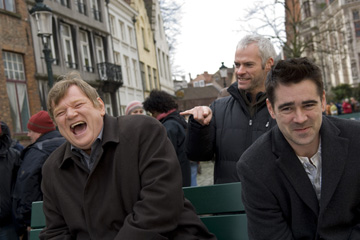 What
was it about Bruges that inspired you to write this? Why Bruges?
What
was it about Bruges that inspired you to write this? Why Bruges?
I
just went there on a weekend trip from London. A couple of days, [I] got a
train there not knowing anything about it at all really. I had seen a
picture, I think, on the internet or somewhere. I was just struck by how
beautiful it was: unchanged, medieval and gothic. And otherworldly. I just
wondered why it hadn’t been captured on film before, when it’s so
distinctive. In the middle of the second day I had gone to every museum
twice and every church three times. (chuckles) It’s kind of a small
place. I was bored off my tits and just wanted to get drunk and anything.
Just get out of the place. That kind of became two warring characters in my
head – the culture loving geek and the drunken slut. So I just let those
characters kind of speak to me in my head. I thought why would two people be
in a town like Bruges when they didn’t want to be? That’s when the whole
idea of them being hit men came up and they’re escaping a horrific job that
went wrong. It came up that they had been sent there and told to await
orders. But it’s completely organic. Bruges wrote itself into it. If we
hadn’t been allowed to shoot there, I would have scrapped the whole thing.
There isn’t any other place which would have served the same purpose. Venice
or Paris or Prague – they’re all beautiful, but they didn’t have both the
strange quirkiness of Bruges and also the unknown quantity. Most people
don’t really know anything about it. Those are the characters in the film.
[They] kind of say, “Where the fuck is it?” Which is kind of what I said
before – which is fine, you know. That’s what the characters are feeling.
You have sort of a holy trinity of European actors here. When you were
writing it, were you thinking of these actors? How did they come to it?
No,
I never really wrote for any specific actor, ever. Originally they were
written as all three were London gangsters. I’d worked with Brendan before
on a short (“Six Shooter”)… but when the possibility of working with Colin
and Brendan came up I thought it was ridiculous to make them put on London
accents on top of it when it’s such a really easy change to make them Irish.
I think it added an extra kind of interesting persona to the whole thing as
well – having a British boss for two Irish gunmen. I’d met Colin before,
once, socially, and liked him a lot. I wanted to utilize some of the more
obvious aspects that he had – like the sexiness and a dangerous image or
talents that he has. Then also bring out what I got to know he also had: a
vulnerable side. A funny side, too. He became perfect for it. Ralph, I
wanted to cast completely against type. There are like a dozen actors who
have done that kind of part before. I wanted to completely avoid that and go
to someone who would bring a complete intensity, you know? A darkness and a
danger to it. Then he also brought something I hadn’t really seen before,
which was brilliant comic timing. I think that’s also born out of saying
things truthfully. All three of them were always after the truth of it. They
weren’t playing the gags at all. That’s why I think it’s a funny film. It’s
all rather true. We bring the comedy to it. They don’t.
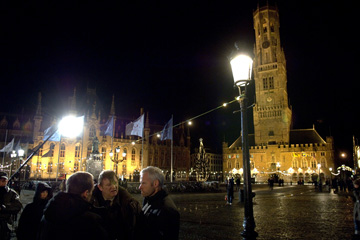 You
mentioned the medieval scenery. Is the film itself medieval?
You
mentioned the medieval scenery. Is the film itself medieval?
I
know, it feels a certain… there’s a religious quality to it in some ways. It
deals with issues of Heaven and Hell and purgatory and things like that. All
of the arc that we see in it is pretty graphic, medieval, torturous kind of
stuff. The film overall, I’m not sure. I couldn’t really say.
Can you talk a little about moving from the stage to the screen, and also
about the expectations raised by winning an Oscar for your short?
I
was really scared of the move in lots of ways, because starting out in
theater… I was never brought up on theater. I always had a kind of healthy
disrespect for it. (chuckles) I always tried to write plays that a
film fan – which is what I was – would like in some ways. Plays for people
who don’t like plays. But because I had a disrespect for the form – at the
outset, anyway – it was easy to write plays that were kind of different, I
guess. Shake things up a little bit. Then with film, I’d always loved
everything about great cinema. From the age of twelve or fourteen I was
watching everything from Scorsese and Terrence Malick to Kurosawa and Orson
Welles. It was much harder to even write a script, because of fear of that
kind of company. So it took a while. It took a lot longer than the plays
took. Then the move where I made the short – that was difficult in its own
way, but it didn’t put me off completely. I learned a few things… both good
and bad… on it that I brought to this. The Oscar thing had no bearing. I
honestly didn’t think about it for a second.
Were there expectations to try and…
No.
I mean I had the expectation fears of just doing a longer film. Just for the
sake of it, not for the awards it would get. I just wanted to have one good
thing to leave behind. With the plays it’s always once they are done,
they’re done. You don’t really have a record. So just to get something right
was the most important thing. The Oscar thing was just kind of a dreamy,
crazy, nonsensical thing that was great, but nothing to do with real life.
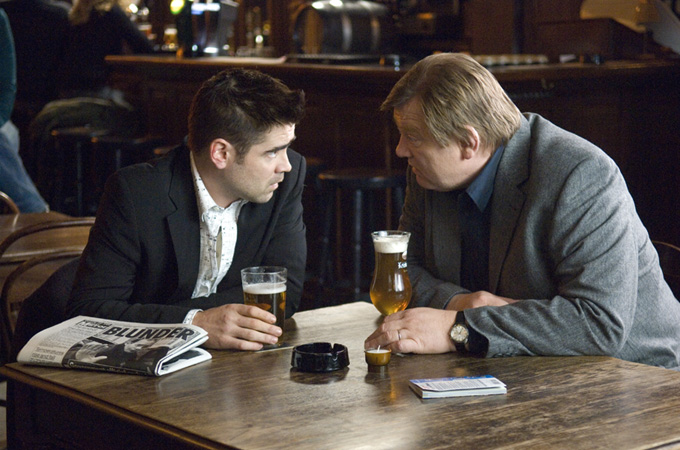 How
did you learn to make a film?
How
did you learn to make a film?
Just
watching over and over lots of my favorite films and storyboarded an awful
lot. After the script was written, just tried to think in images rather than
words and characters. It’s kind of a laborious process, just drawing every
single image to every single scene. I didn’t necessarily stick to all of
them, but I’d bring them all to the DP [Director of Photography Eigil Bryld],
whose brains I’d pick all that stuff as well. He helped me an awful lot. It
was just a process, like anything, just trial and error. Just tried to learn
it, you know? The most important thing was not to make a playwright’s film –
or what I saw as a playwright’s film. I wanted something that wasn’t just a
couple of guys walking around the town for two hours chatting. I wanted
something much more cinematic, if that was possible. But also I didn’t want
to run away from what I like about theater – which is the dialogue and
interesting, different characters. I hope I got the balance right. Bruges
helped, cinematically, too. Every corner you turn is another beautiful or
dark and dangerous image. That helped.
What are some of those favorite movies that you watched?
Everything from Badlands to Taxi Driver to The Night of the
Hunter to The Good, The Bad and the Ugly. Seven Samurai. Broadway
Danny Rose always pops up. I like that one a lot. But for this
specifically it was Don’t Look Now and Performance. Don’t
Look Now is a good template for trying to capture a city as a character
in a film. When we got towards filming, it wasn’t so much looking at any
other films to make them. It was more of an analytical thing. Do you
use a two shot or two short singles? That sort of thing.
You had worked with Brendan before in the short. What was it like to work
with him on a feature? Why did you think he’d be right for the character?
He’s
just a great actor, first and foremost. He’s an awful lot of fun. He always
brings an awful lot of humanity to all of his roles, even though he has
played pretty dark and dangerous characters. He helped me so much on the
short. He protected me and stood up for me – just showed me how to do it in
lots of ways. So he would always be sort of a natural go-to person. I also
knew he and Colin wanted to work together for a while, too. They were just
kind of perfect. Complimented each other completely. They have an ease
together and a fondness for each other, which I think is kind of palpable.
Both just great fun.
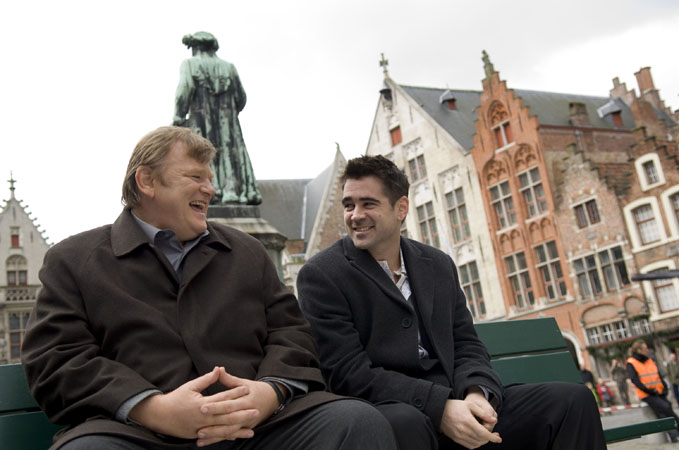 Had
you realized that they had never worked together? Did you think that was
weird?
Had
you realized that they had never worked together? Did you think that was
weird?
I’m
not sure if I had until I spoke with them a little bit individually. I
remember each of their eyes lighting up when I said the name of the other
person who was going to be involved. I’m not sure why they hadn’t.
Strangely, two Irish guys had big Hollywood success, it’s odd that they
hadn’t been paired together before.
Which section pleased you the most, cinematically? It doesn’t play like a
novice’s movie. It’s very cinematically sophisticated.
Thank you. Simple things like the boat trip. I like the detail of that: such
a lovely, crisp, strange morning where we went riding around. Lots of that
was improvisational stuff. The kind of back and forth… That was fun. Then
the later sequence the shooting when he’s on the boat… actually the most
exciting was the chase scene, running down through the dark streets at
night. Basically, we just went on a little camera truck, which we tried to
drive as fast as possible and get the guys to run as fast as possible.
Colin’s a big smoker and Ralph is fit, but we couldn’t do that very many
times. (laughs) So it was cool to just go as fast as possible to keep
from both being shot at the same time, but still be up close and so intimate
with them. A little exciting and jagged, but then having the gunshots go off
and little explosions. That was pretty cool. That was a full storyboard. We
followed those pretty strictly. That was sweet. That was fun to edit, too.
You see so much of… you can do that; it’s a literal run from where they are.
It is matched up. If you went to Bruges, that’s exactly… obviously we cut,
cut, cut… but it’s a path of 400 meters or something that they traversed.
I
wanted to ask you about the dwarf. Last year,
Death at a Funeral was
a huge black comedy. Black comedies don’t come around that often. Now, there
was a dwarf there, there’s a dwarf here…
(laughs) Yeah.
Do you think they force black comedies to have a dwarf in their movies? Hmm…
I never thought of that. That’s interesting. The Wizard of Oz, that’s
pretty dark, too. I don’t know. With that character, if you are trying to
write a fully-rounded dwarf/little person character, who happens to be an
actor, it kind of lends itself to exploring a darker theme. Because,
obviously all they ever get to play is an elf or a munchkin or something
like that. So I kind of wanted to explore how does that affect you if you
are a good actor? How do you live? What do you turn to? How does it make you
feel? In this case, he turns to coke and hookers. But it was just to explore
something different in a character like that – but not necessarily black or
comic. Just trying to create someone who would bring the plot to the place
it has to go.
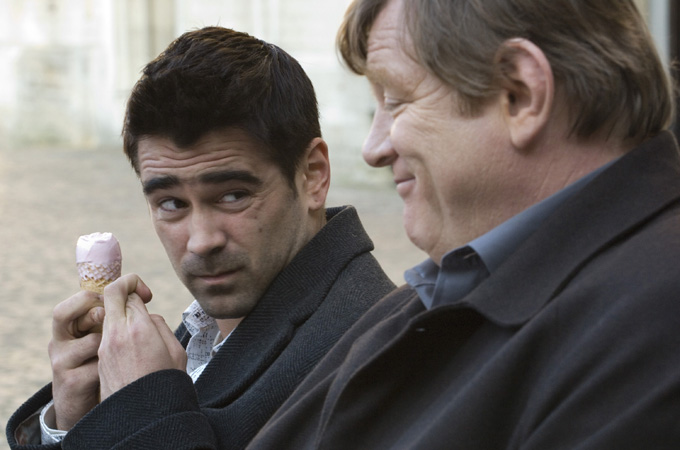 It
was a lot of fun playing the formality of the setting with the Irish
accents. When you decided to change them from British to Irish, did you that
change the characters much?
It
was a lot of fun playing the formality of the setting with the Irish
accents. When you decided to change them from British to Irish, did you that
change the characters much?
No.
I thought it would as well. I thought what I was getting at almost a little
bit of a London working class sensibility of being anti-Europe. Then when
you get to Dublin, you realize there’s quite a strong degree of that, too.
Overall I think there is more of a fondness for Europe in Ireland than
certainly there is in England, but not with a certain echelon, I guess. A
certain society. The toughest change to make was just in my head. The
script, actually, was easy. I think maybe the working-class London idiom
isn’t too far removed from working class Dublin. It didn’t turn out to be a
big issue when I was changing it. It was great to hear those two boys using
their own accents for once. It lends the film a whole extra dimension.
Do you live in Ireland now, or are you based in London?
London.
How much artistic freedom did you allow as a director? They had a lot of
great lines, but some of it was a little rough, particularly to some of the
people Ray saw…
In
their defense, they followed every line and every word that I wrote.
(laughs) But, they had artistic freedom to bring whatever they were
bringing to it. They stuck word for word to the script, so you’ve got to
blame me for any offense caused. I certainly wasn’t trying to offend
anybody, any of the characters. Also I was trying to write certain – in
Colin’s character, you know, the opposite of me in lots of ways. As a
person, I’m kind of PC, liberal and all those things, but I think your
characters shouldn’t just be mouthpieces for your beliefs. So that’s where
he is. Even him, he says pretty near the knuckle stuff, but it’s all from
almost a childlike place. I hope it won’t come across as offensive. It will
come across as outrageous, I think, but hopefully not offensive. Certainly,
I don’t think the tone and tenor of the film is that – always trying to back
that up.
Watching the movie, it seems you got a lot of cooperation from the people of
Bruges. Why do you think that was, because they hadn’t had a lot of
experience with a major feature film?
I
think so. They were just lovely people who welcomed us in. Didn’t ask to see
the script, even though we wanted to show it to them so all our cards would
be on the table. Their main thing was… Bruges’ tourism is its major economic
drive. Their main thing was just to have the beauty of the place captured as
truthfully as possible. There hasn’t been really ever a feature – certainly
not a Hollywood feature, but even Belgian films: there aren’t an awful lot
and none of them are ever set in Bruges. They just wanted to get images of
the place out there, really. But I was kind of worried that they might think
we were going behind their backs with the things like what Ray says about
the place. We showed it to them like that three weeks ago – the mayor’s
office and all the Belgian crew. They all really liked it. We were true to
our word to make mind to capture how beautiful and strange the place was. I
think that comes through.
I
can’t wait to go there…
(laughs) Yeah,
a few people have said that.
As long as there aren’t all those hit men…
Well, I think they’re all dead. (laughs again)
What’s fun about writing a film as compared to the stage?
I
guess that… and it’s the thing I found hardest about it initially… the idea
that you can just jump around in time and space. It was hard to juggle all
of those elements originally, but then that became the fun thing. To go
anywhere. The next scene can be set anywhere. Also saying things on screen
that no one has said before, exploring a different kind of sense of humor.
That’s more interesting when you actually get to do it, then you have to
kind of write it. To be allowed to go there was kind of cool.
Email
us Let us
know what you
think.
Features
Return to the features page.